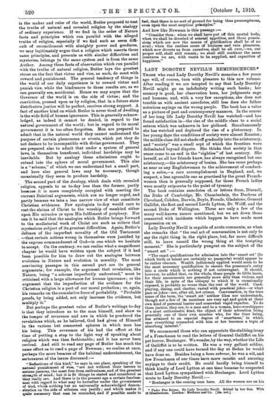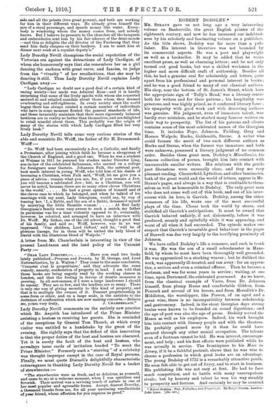LADY D OROTHY NEVILL'S REMINISCENCES.* THOSE who read Lady Dorothy Nevill's
memoirs a few years ago will, of course, turn with pleasure to this new volume. After reading it we are tempted to say that Lady Dorothy Nevill might go on indefinitely writing such books ; her
memory is good, her observation keen, her judgments sage and humane, and, with a very few exceptions, she does not trouble us with ancient anecdotes, still less does she father notorious sayings on the wrong people. The book has a value as a picture of past and contemporary manners. In the course of her long life Lady Dorothy Nevin has watched—and has found satisfaction in—the rise of the middle class to a social esteem which was unknown in her girlhood. Simultaneously she has watched and deplored the rise of a plutocracy. In her young days the conditions of society were almost Russian; the middle class did not shade off gradually into the aristocracy, and " society" was a small sept of which the frontiers were delimitated beyond dispute. She thinks that society in that sense came to an end in the "eighties" of last century. She herself, as all her friends know, has always recognised but one aristocracy,—the aristocracy of brains. She has come perhaps as near as any Englishwoman to the achievement of conduct- ing a salon,—a rare accomplishment in England, and, we
suspect, a less agreeable one as practised by the great French- women than is generally supposed, for those French ladies were mostly exigeantes to the point of tyranny.
The book contains anecdotes of, or letters from, Disraeli, the Duke of Cambridge, Mr. Chamberlain, the Duchess of
Cleveland, Cobden, Darwin, Doyle, Froude, Gladstone, General Gallifet, the first and second Lords Lytton, Dr. Wolff, and the second Duke of Wellington. These are only a few of the many well-known names mentioned, but we set down those connected with incidents which happen to have made most impression on us.
Lady Dorothy Nevill is capable of acute comments, as when she remarks that "the real art of oonversation is not only to say the right thing in. the right place, but, far more difficult still, to leave unsaid the wrong thing at the tempting moment." She is particularly pungent on the subject of the " smart set "
" The exact qualifications for admission into the 'smart set' (to which birth or talent are certainly no passports) would appear to be rather obscure. Wealth judiciously applied would seem to be the most necessary qualification to ensure the possessor's entry into a circle which is nothing if not extravagant. It should, however, be added that, on the whole, these people do little harm, for their amusements are generally more silly than vicious, and their life, in spite of the obloquy to which it is occasionally exposed, is probably no worse than the rest of the world. Card- playing, dining, and chatter, varied with practical jokes—or what pass as jokes—are, after all, not crimes. Conversation, in the true sense of the term, the 'smart set' neither likes nor understands, though not a few of its members are very apt and quick at their own kind of personal banter and somewhat vapid repartee. To do them justice, they are, to a man and to a woman, hero-worshippers of a most enthusiastic kind, the object of their adoration being generally one of their own number who, for the time being, has attained to an especial degree of smartness,' in which case everything connected with him or her becomes a topic of absorbing interest."
We recommend those who can appreciate the stabbing irony of a Frenchman to read the letters of General Galliffet on his pet horror, Boulanger. We wonder, by the way, whether the Life of Galliffet is to be written. He was a very gallant soldier, and if any one could have turned the day at Sedan he would have done so. Besides being a beau sabreur, he was a wit, and few Frenchmen of our times have more caustic and amusing sayings to their credit. He could hardly bring himself to think kindly of Lord Lytton at one time because he suspected that Lord Lytton sympathised with Boulanger. Lord Lytton wrote to Lady Dorothy Nevill
:-
"Boulanger is the coming man here. All the women are on his
• Under Five Reigns. By Lady Dorothy Nevill. Edited by her Son. With 16 Mx:nitrations. London : Methuen and Co. [15e. net.] •
aide and all the priests (two great powers), and both are working for him in their different ways. He already gives himself the airs of a royal personage, and spends money like water. Every- body is wondering where the money comes from, and nobody knows. But I believe he presents to the churches all the bouquets and embroideries sent him by his fair adorers of the demi-monde —and this so delights the old devotes of the Faubourg that they send hini daily cheques on their bankers. I am to meet him at dinner next week at a royalist deputy's."
Lady Dorothy Nevill champions the social reputation of the Victorian era against the detractions of Lady Cardigan, of whom she humorously says that she remembers her as a girl dancing the eachuca with great verve, and fancies, to judge from the " vivacity " of her recollections, that she may be dancing it still. Thus Lady Dorothy Nevin explains Lady Cardigan away :-
" Lady Cardigan no doubt saw a good deal of a certain kind of racing society—her uncle was Admiral Rous—and it is hardly surprising that some of the lively spirits with whom she consorted sneered at and retailed scandals about those whom they deemed overbearing and self-righteous. In every society since the world began there has always existed a certain number of individuals who have in some measure flouted the general standards of life, and these invariably maintain that their more rigorously behaved brethren are in reality no better than themselves, and are delighted to retail scandal about them. This probably was the origin of many of the stories with which Lady Cardigan filled her very lively book."
Lady Dorothy Nevill tells some very curious stories of the able and eccentric Dr. Wolff, the father of Sir H. Drummond- Wolff:— "Dr. Wolff had been successively a Jew, a Catholic, and finally a Protestant, after joining which faith he became a clergyman of the Church of England, and a good one. When he was a student at Weimar in 1811 he pursued his studies under Director Ling, son-in-law of the celebrated Saltzmann, who carried on a college for foreigners near Gastein. Johannes Falk, the satirical poet, took much interest in young Wolff, who told him of his desire of becoming a Christian, when Falk said, Wolff, let me give you a piece of advice : remain what you are, for, if you remain a Jew, you will become a celebrated Jew ; but, as a Chriktian, you will never be noted, because there are so many other clever Christians
in the world.' He had a great opinion of himself and of the clever ram to which he belonged, and when he talked of his marriage with my aunt, Lady Georgians, would say, by way of teasing her, ' I, a Rabbi, and the son of a Rabbi, demeaned myself by marrying the little Shentile woman.' At first Lady Georgian's family were very averse to such a match, my father in particular was for a time violently opposed to it ; eventually, however, he relented, and arranged to have an interview with Dr. Wolff. My father, one of the old school, thought a good deal of his family, and said so; Wolff, however, was in no way impressed. ' Our children, Lord Orford,' said he, will be of glorious lineage, for in them will be united the holy blood of David with the illustrious blood of Walpole."
A letter from Mr. Chamberlain is interesting in view of the present Land-taxes and the land policy of the Unionist Party
"Deka LADY DOWTHY,— Have you read two books
lately published—Progress and Poverty, by H. George, and Land Nationalisation, by A. Walton ? They come to the same conclusion, l'ennemi c'est le proprietaire,' and they advocate the same remedy, namely, confiscation of property in land. I am told that these books are being eagerly read by the working classes in London, and that the feeling in favour of drastic measures is growing. In all seriousness, if I were a large landowner I should be uneasy. They are so few, and the landless are so many. There is only one way of giving security to this kind of property, and that is to multiply the owners of it. Peasant proprietorship in some form or other, and on a large scale, is the antidote to the doctrines of confiscation which are now making converts.—Believe me, yours very truly, J. CHAMBERLAIN."
Lady Dorothy Nevill comments on the entirely new practice which Mr. Asquith has introduced of the Prime Minister assisting a hostess in receiving her guests. She is reminded of the receptions by General Tom Thumb, at which every visitor was entitled to a handshake by the guest of the evening. She rightly says that the defect of this innovation is that the proper duties of the host and hostess are obscured. Yet it is surely the fault of the host and bootees, who nowadays issue cards of invitation headed " To meet the Prime Minister." Formerly such a "starring " of a celebrity was thought improper except in the case of Royal persons. Finally, we must quote Disraeli's delightfully charaeteristie extravagance in thanking Lady Dorothy Nevill for a basket
of drawberries :—
" The strawberries were as fresh, and as delicious; as yourself, and came to ms at a welcome moment, when I was spiritless and feverish. Their arrival was a reviving touch of nature in one of her most popular and agreeable forms. Accept, dearest Dorothy, a thousand thanks from me, for all your unceasing recollections of your friend, whose affection for you requires no proof."



























































 Previous page
Previous page